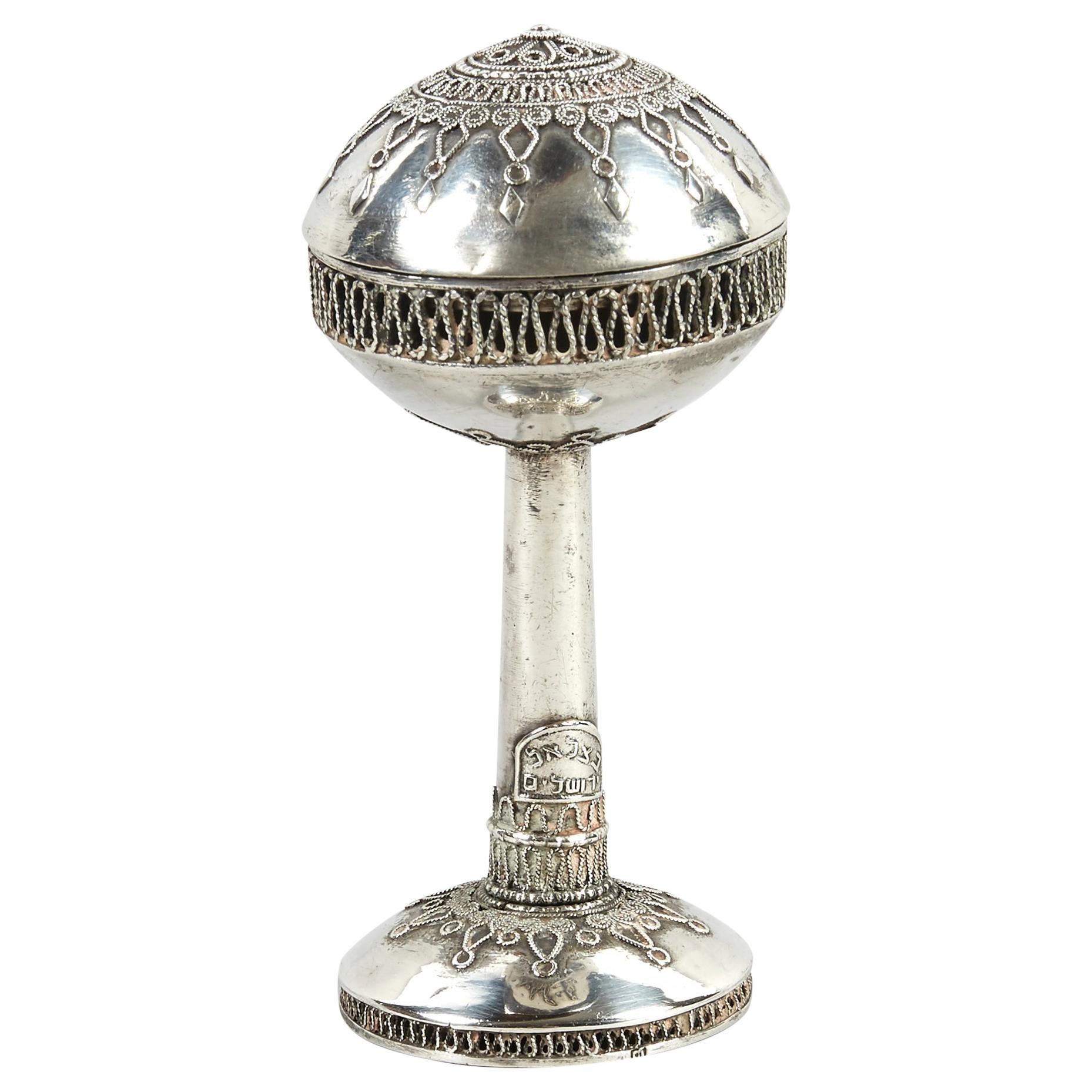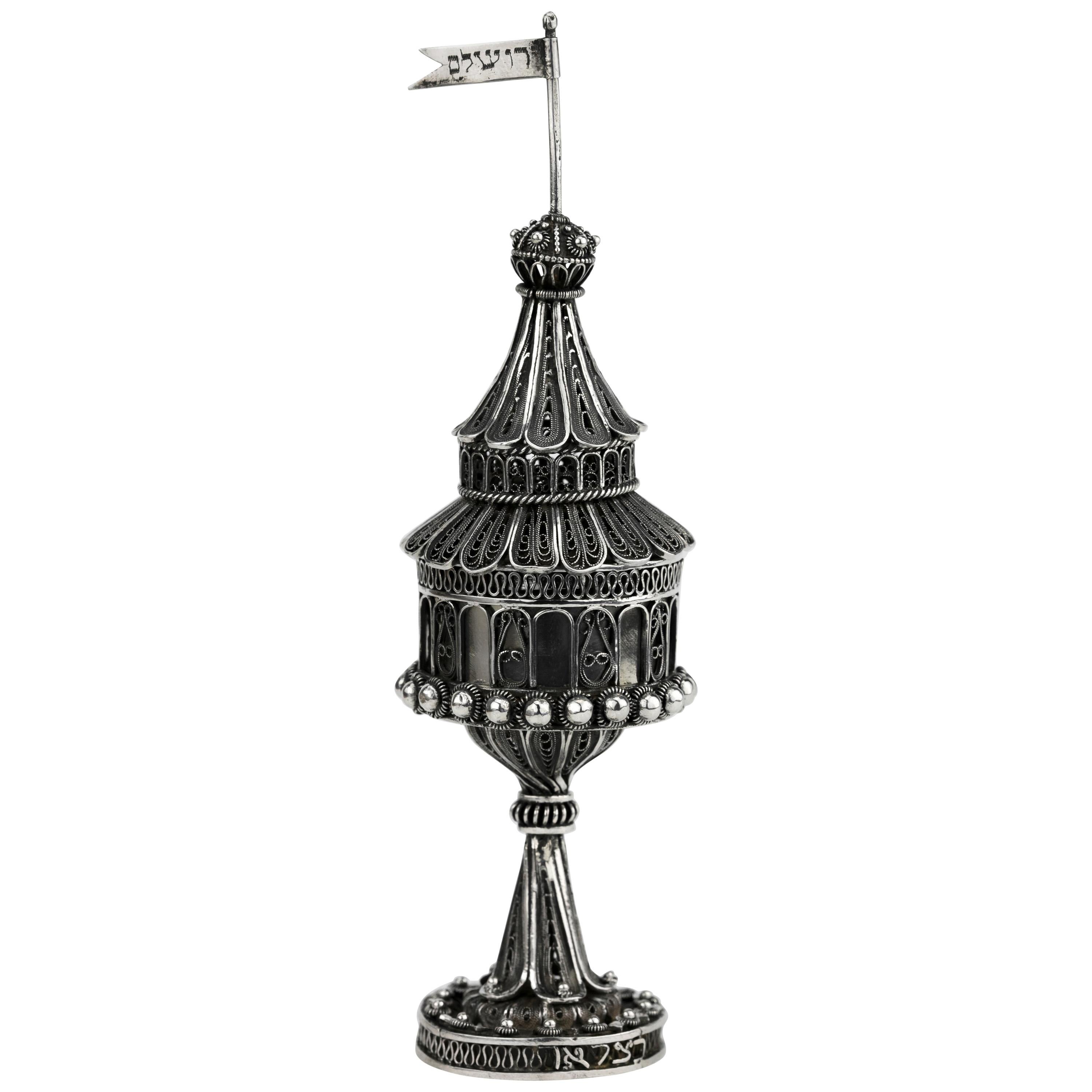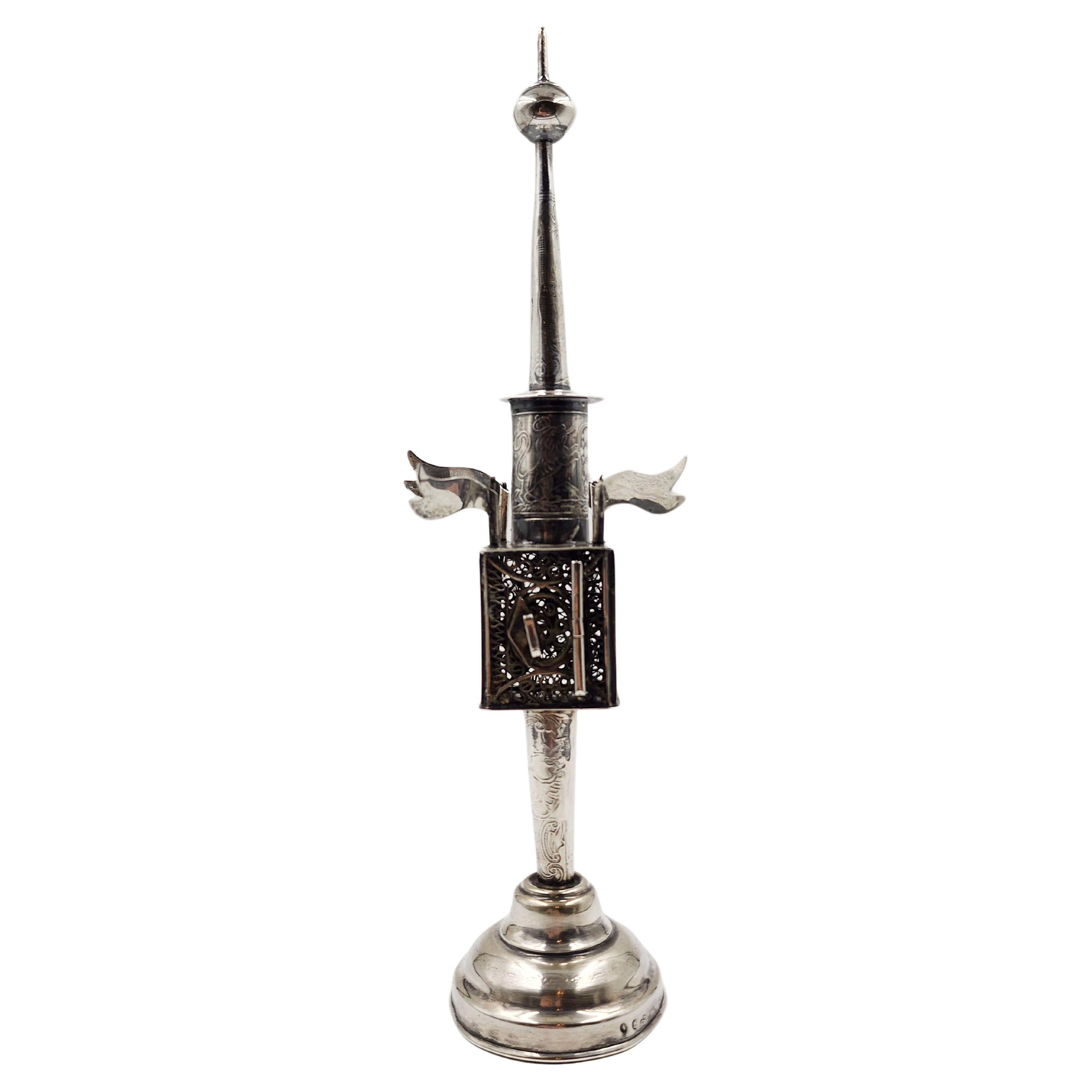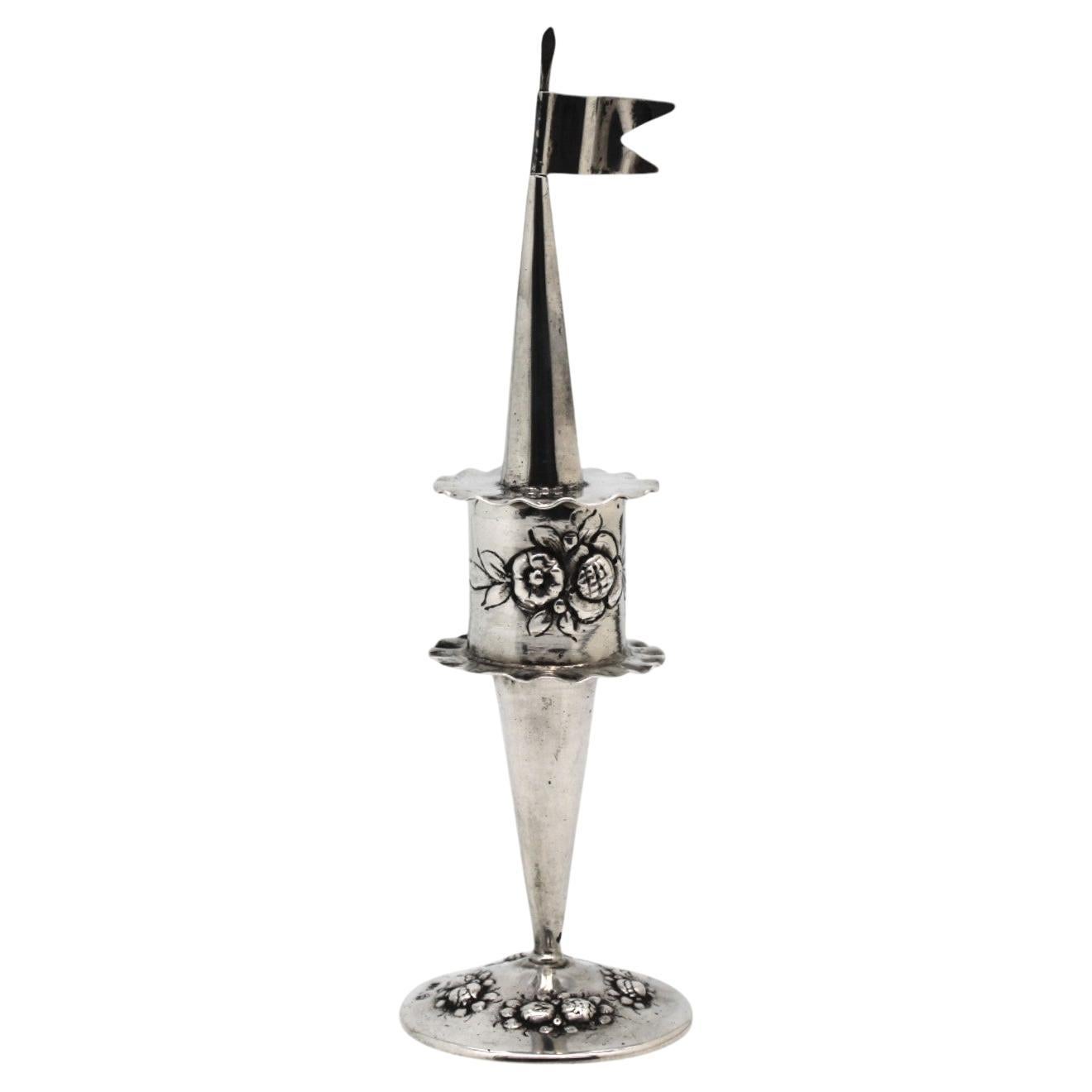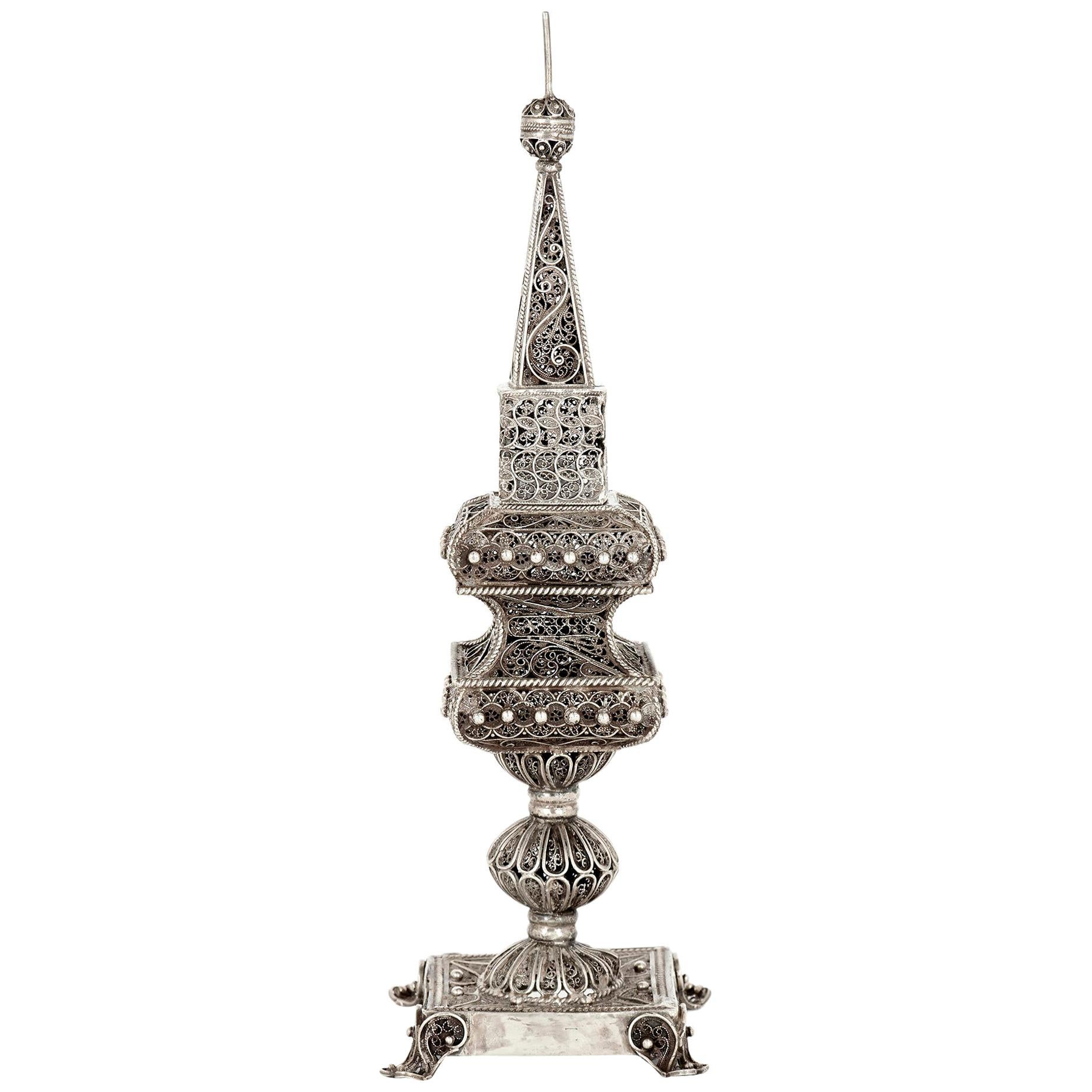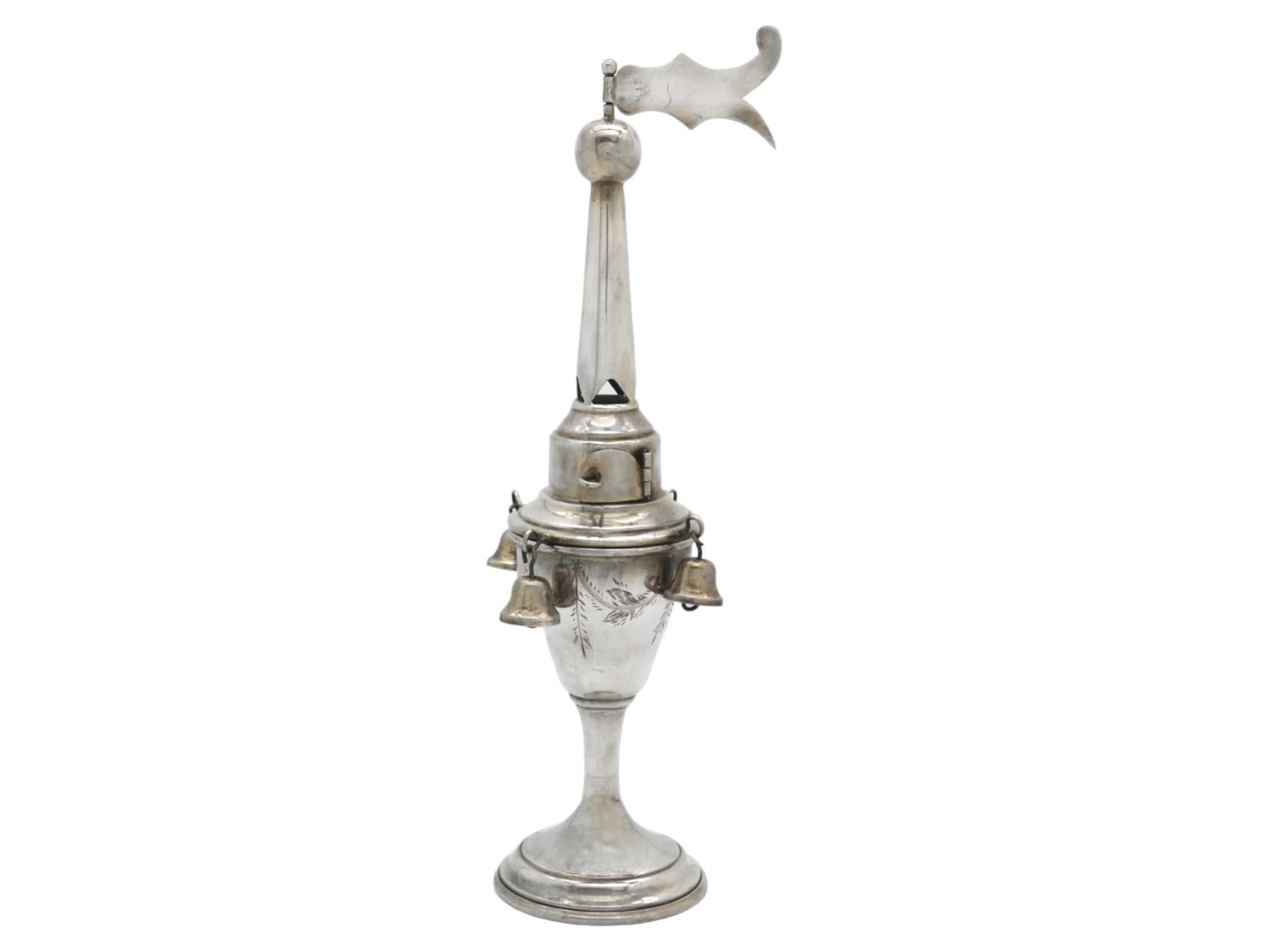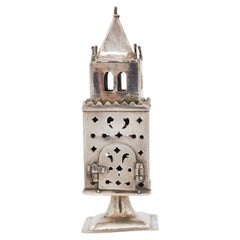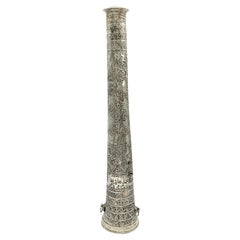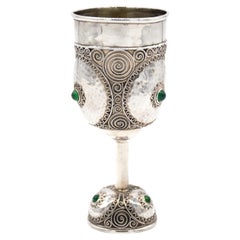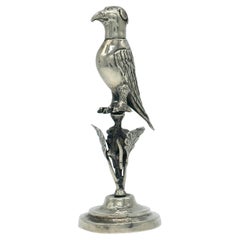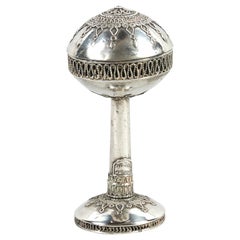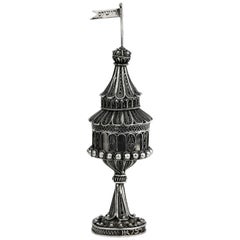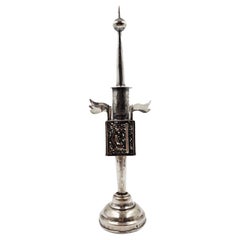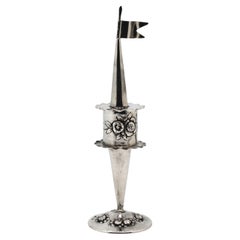Items Similar to Early 20th Century Silver Spice Tower by Yehia Yemini, Bezalel School Jerusalem
Want more images or videos?
Request additional images or videos from the seller
1 of 9
Early 20th Century Silver Spice Tower by Yehia Yemini, Bezalel School Jerusalem
$9,000
£6,870.24
€7,897.80
CA$12,664.61
A$14,083.57
CHF 7,397
MX$172,185.78
NOK 92,173.66
SEK 86,894.87
DKK 58,943.13
About the Item
Very rare Bezalel Jerusalem silver filigree spice tower, this amazing spice Tower was Made by Yehia Yemini, who was the best filigree artist in bezalel, this spice Tower will Date from around 1910-20 , The Havdala ceremony at the conclusion of the Sabbath Features a special blessing over a spice receptacle. Of the numerous forms of Such Receptacles, the most common are tower-shaped, usually emulating the towers of European cities.
Yemini transcended the old tradition of making spice containers designed like towers From the early times but in this case his spice container echoes the Yemenite bridal Headdress, and another famous theme is bezalel works that was the cupressus tree Which is also in the shape of this tower, A simple and highly integrated conic structure, it Consists entirely of tight filigree lace and numerous silver balls, interwoven in undulating Ornamentation, the top has a faceted red stone, probably garnet. The inner rim of the Base is marked with Hebrew "Bezalel " and a later tax mark.
For an identical spice tower please visit the website of "Boston museum of fine arts" in The Schusterman collection.
On the last two pictures you can see an almost identical spice tower (with a small bird on the top instead of the red stone which was the more expensive option) featured on the book dedicated to the works of the Yemini family.
the next picture after was taken in 1909 in the old Bezalel silver department in Jerusalem (Yehia Yemini is standing in the middle of the picture)
Measurements :
Height: 5.3 inch / 13.5 cm
Wide : 1.8 inch / 4.5 cm
Yehia Yemini Born in 1897 into a family of San'a silversmiths, Yehia Yemini reached Jerusalem with his family at the young age of three. When Bezalel founded its Silver Department In 1908, Yemini became one of its employees, and helped other Yemenites To forge Bezalel's unique synthesis of East and West. After the dismissals of 1914, Yemini Joined three groups of Jerusalem craftsmen who specialized in silver crafting in the Manner of Bezalel: "Keter," "Kav Lavan," and "Sharar" (directed respectively by Shneior, Ossanovitch and Rabinovitz). Yemini was exceptionally talented and skilled in blending The traditions of Yemenite silver work with the design directions supplied by Ze'ev Raban. He established his workshop in the ground floor of his home in a Jerusalem Neighborhood, known as Neveh Bezalel. To supplement his livelihood, he also worked as A torah scribe. In time, his craftsmanship gained prestige, both local and international. In 1931, he won a silver medal at the Paris world exhibition and in 1932, he won a gold medal At the Yarid Hamizrach exhibition in Tel Aviv. In 1937, he fashioned the Torah scroll cover And receptacle for the letter of goodwill, which were presented to King George VI on the Occasion of his coronation. Yemini continued to actively work and produce Jewish ritual Articles of filigree silver until the age of 85. He passed away in Jerusalem in 1983. "Then The Lord said to Moses, See, I have chosen Bezalel son of Uri, the son of Hur, of the tribe Of Judah, and I have filled him with the Spirit of God, with wisdom, with understanding, With knowledge and with all manner of workmanship - to make artistic designs for work in Gold, silver and bronze, to cut and set stones, to work in wood, and to engage in all kinds Of crafts." (Exodus 31, 1-5). Established in 1906 by artist Boris Schatz as the “Bezalel School of Arts and Crafts”, Bezalel has evolved into one of the world's most prestigious Art schools. The name Bezalel is synonymous with more than 100 years of Israeli art, Innovation and academic excellence. Bezalel’s unique strength stems from the numerous Breakthroughs it has been responsible for and its ability to respond and adapt to cultural Changes. It takes pride in its numerous generations of graduates, the spearhead of Israeli Artists, designers and architects, in Israel and around the globe. The Bezalel Academy of Arts and Design is, first and foremost, a group of talented, inspired and motivated artists And professionals. Both faculty and students are driven by a passion to create and by Their dedication to quality and excellence. These two pillars of the Academy have placed Bezalel at the epicenter of Israel’s cultural discourse and at the forefront of its artistic Scene, making it instrumental in shaping the country’s cultural identity.
- Dimensions:Height: 5.32 in (13.5 cm)Width: 1.78 in (4.5 cm)Depth: 1.78 in (4.5 cm)
- Materials and Techniques:
- Place of Origin:
- Period:
- Date of Manufacture:1920
- Condition:Wear consistent with age and use. very good overall condition, some minor scratched and wear due to use.
- Seller Location:Tel Aviv - Jaffa, IL
- Reference Number:1stDibs: LU8130235400752
About the Seller
No Reviews Yet
Vetted Professional Seller
Every seller passes strict standards for authenticity and reliability
1stDibs seller since 2023
- ShippingRetrieving quote...Shipping from: Tel Aviv - Jaffa, Israel
- Return Policy
Authenticity Guarantee
In the unlikely event there’s an issue with an item’s authenticity, contact us within 1 year for a full refund. DetailsMoney-Back Guarantee
If your item is not as described, is damaged in transit, or does not arrive, contact us within 7 days for a full refund. Details24-Hour Cancellation
You have a 24-hour grace period in which to reconsider your purchase, with no questions asked.Vetted Professional Sellers
Our world-class sellers must adhere to strict standards for service and quality, maintaining the integrity of our listings.Price-Match Guarantee
If you find that a seller listed the same item for a lower price elsewhere, we’ll match it.Trusted Global Delivery
Our best-in-class carrier network provides specialized shipping options worldwide, including custom delivery.More From This Seller
View AllEarly German Silver Augsburg Baroque Spice Tower, Hans Jacob Ernst , circa 169
Located in Tel Aviv - Jaffa, IL
One of the earliest spice towers we could find, it is very rare to see judaica
from the 17th century, and this 1690s spice tower is super scarce, a true gem of Baroque silver and ba...
Category
Antique 1690s Sterling Silver
Materials
Silver
Rare silver Tantur or Druze head ornament, hand made, Lebanon 18th century
Located in Tel Aviv - Jaffa, IL
up for sale is This rare and important item known as a Tantur, made from silver in the 18th century. This conical headdress was worn by Druze and some Maronite women in the mountain ...
Category
Antique 18th Century Lebanese Antiquities
Materials
Silver
Important Early 20th Century Silver Kiddush Goblet by Bezalel School Jerusalem
Located in Tel Aviv - Jaffa, IL
Important Handmade sterling silver Kiddush goblet by Bezalel School, Jerusalem, circa 1910-1913.
On round base decorated with silver filigree and Cabouchon shaped green agate applications.
The base fitted with Bezalel mark. The upper portion is all adorned with amazing filigree work, the base and the actual cup adorned with swirling filigree designs, in the middle there are 3 roundels, made in another technique of hammered silver, similar to the works that were produced in this time all over Europe, in the middle of each roundel there is a perfectly centered Cabouchon green agate.
This work is attributed to Yehia Yemini.
The goblet is marked on the base, with the earliest silver mark of the school that just say "Bezalel" in Hebrew.
Yehia Yemini :
Was one of the biggest and must famous Bezalel silver...
Category
Early 20th Century Israeli Jugendstil Sterling Silver
Materials
Silver
RARE Austrian silver (ALT WIEN) Havdalah spice container, Judaica ISRAEL MUSEUM
Located in Tel Aviv - Jaffa, IL
Up for sale is this museum quality Judaica Havdalah spice container, very rare with great provenance!!
This silver spice tower was made in Vienna Austria, on the early part of the 19...
Category
Antique Early 1800s Snuff Boxes and Tobacco Boxes
Materials
Silver
Rare "Safed" kiddush cup, late 19th century Poland/ Eretz ISRAEL
Located in Tel Aviv - Jaffa, IL
This 84 silver cup was made in Europe, in Poland or parts of Poland that are in modern Russia in the 19th century, the interesting and important in this cup types is that they were s...
Category
Antique 1890s Israeli Sterling Silver
Materials
Silver
Bezalel Jerusalem silver Hanukah lamp set with stones, Yehia Yemini circa 1920s
Located in Tel Aviv - Jaffa, IL
A Silver Hanukkah lamp crafted by Yehia Yemini in Jerusalem circa 1920 is a fascinating piece of Judaica. Yehia Yemini was known for his intricate and detailed silverwork. This lamp ...
Category
Vintage 1920s Candle Lamps
Materials
Multi-gemstone, Sterling Silver
You May Also Like
Early 20th Century Silver Spice Tower by Bezalel School Jerusalem
Located in New York, NY
Silver and silver filigree spice container, Jerusalem, circa 1920.
Ball spice container raised on a stem, On a round decorated base with fili...
Category
Early 20th Century Israeli Religious Items
Materials
Silver
$1,040 Sale Price
20% Off
Early 20th Century Silver Spice Tower by Bezalel School Jerusalem
Located in New York, NY
Silver and silver filigree spice container created at Bezalel School Jerusalem, circa 1910.
Marked: "Bezalel Yerushalem" (with soldered silver...
Category
Early 20th Century Israeli Religious Items
Materials
Silver
$8,584 Sale Price
20% Off
Spice TowerJudaica in Silver, 20th Century
Located in Autonomous City Buenos Aires, CABA
Spice Tower in Judaic Silver, 20th Century
A beautiful spice tower of typical design, with four flags, the tower is topped with a small ball. Set on a round leg. Decorated with filig...
Category
20th Century European Art Deco Sheffield and Silverplate
Materials
Silver Plate
A Silver Havdalah Spice Tower, Germany Circa 1900
Located in New York, NY
This exquisite German silver Havdalah spice container, crafted circa 1900, is a refined example of early 20th-century Judaica, blending delicate craftsmanship with elegant form. The ...
Category
Antique Early 1900s German Sterling Silver
Materials
Silver
Silver Filigree Judaica Spice Tower
Located in London, GB
The body of this large spice tower is decorated all over with fine filigree work, wrought into scrolled and geometrical designs. The tower, supported by a ...
Category
20th Century European Religious Items
Materials
Silver
An English Silver Kiddush Goblet and Spice Tower Compendium, London 1927
Located in New York, NY
An Elegant English silver Kiddush goblet and spice tower compendium from London, 1927, is a valuable and culturally significant piece of Judaica.
The Jewish community in England has a rich history, and by the early 20th century, London was home to a vibrant and culturally active Jewish population. English silver craftsmanship is known for its high quality and attention to detail. This Piece of Judaica reflects a blend of traditional Jewish themes...
Category
Vintage 1920s British Sterling Silver
Materials
Silver
$2,000 Sale Price
20% Off
More Ways To Browse
Spice Set
Pillar And Scroll
Old Spice
George Coronation
Antique Glass World Globe
Antique Spice Set
Moses Carved
Antique Spice Containers
Silver Spice Tower
Spice Tower
Antique Spice Tower
Boris Schatz
Sterling Silver Spice Tower
Sterling Silver Card Case
Sterling Silver Condiment Set
Tiffany Flatware Patterns Antique
Vision International Sterling Silver
Asprey Antique Silver
